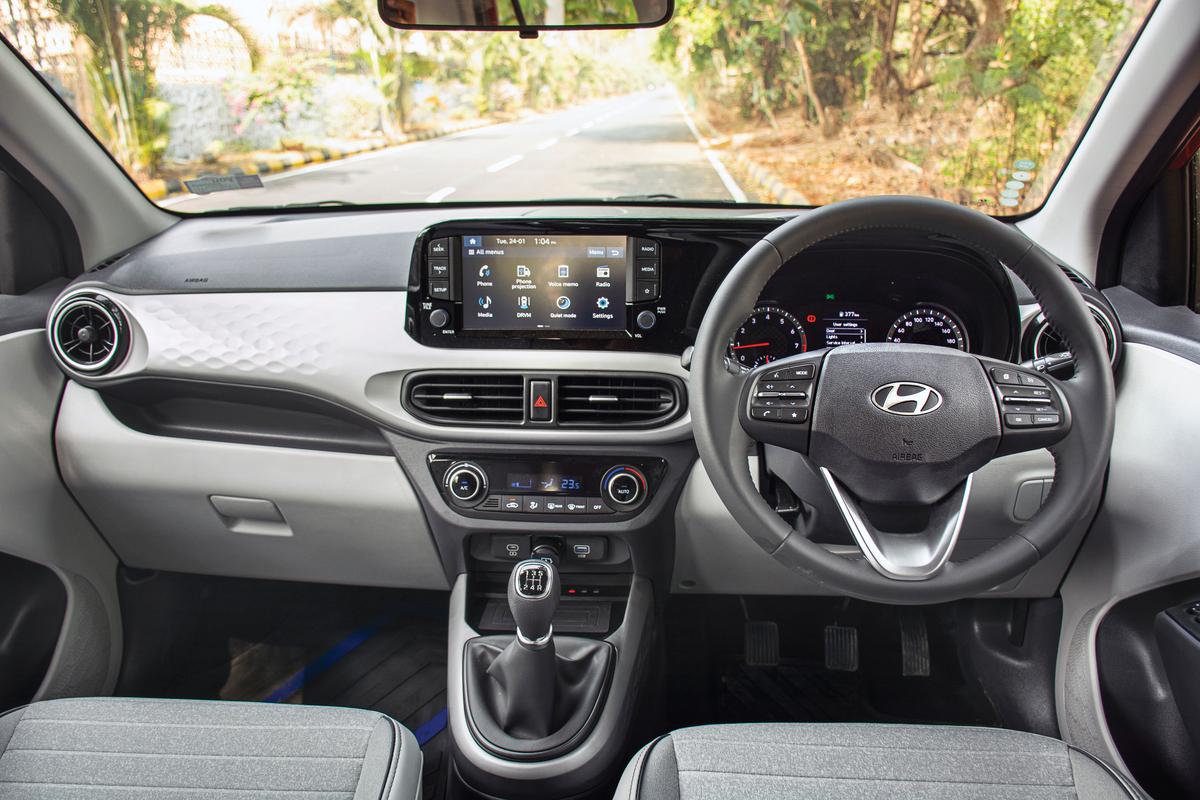[ad_1]
In a world of SUV this and electric that, cars like Hyundai Grand i10 Nios seem to fly under the radar. In fact, Hyundai too did not make half as much noise about this facelifted Nios as it did about the arrival of the updated Venue a couple of months ago. Let us, however, give the sensible and likeable Grand i10 Nios due space and talk of what has changed.
A facelift today means a larger grille, and that is what you get on the Nios too. The grille makes up most of the redone front bumper and there are new tri-arrow daytime running lights lower down as well. There are no changes to the headlights or bonnet but a closer look reveals a flatter, satin finished Hyundai logo in place of the 3D chrome one from before.
At the sides, it gets a new design for the 15-inch diamond-cut alloy wheels that tells you this is the updated Nios. Styling at the back, though, has been jazzed up. The boot lid is reprofiled but the reshaped tail-lights, linked by a band, are more prominent and seem to be trending now. The tail-lamps get updated with LED elements, while the band is merely a reflector and does not light up. The visual tweaks sure make the Grand i10 Nios more eye-catching.
There are fewer changes inside. Lighter colours, new upholstery and a new instrument cluster with analogue dials (the last one had a digital speedometer) help the look in what is a practical and well-thought out interior. Things like the relatively high-set seating, well-positioned touchscreen and loads of storage space mean the Grand i10 Nios remains a car that puts you at immediate ease.
As before, the Grand i10 Nios comes feature-packed in higher-spec avatars. Keyless entry, push-button start, auto climate control, an 8.0-inch touchscreen with Android Auto and Apple CarPlay, a wireless phone charger and rear AC vents are part of the package on the top-spec Asta trim featured here. Feature additions in this update include a Type-C USB charging port and cruise control, though it is the longer list of safety equipment that is noteworthy. Front and side airbags are now standard across the range, while top-spec versions also add in curtain airbags.
Electronic stability control, hill start assist, tyre pressure monitoring system and ISOFIX child-seat mounts are other inclusions on higher spec trims, all of which go above safety regulation norms. As before, the rear section remains surprisingly spacious for two, while the 260-litre boot can accommodate a large suitcase with ease.

With the update, Hyundai has trimmed the Grand i10 Nios’ engine line-up further. The diesel was dropped early last year, while the Turbo variant with the fun 1.0-turbo-petrol engine has also been axed, leaving the 1.2-litre, four-cylinder petrol as the sole engine on offer. It is available with a 5-speed manual gearbox or a 5-speed AMT, and there is a CNG derivative too.
The engine has been made future-ready to meet the upcoming RDE (real world driving emission) norms and can also run on E20, which is petrol with a 20% ethanol blend. In driving, there is no difference. It is a refined and easygoing engine with sufficient power for city driving. It has not got the pep or responsiveness of Maruti’s K12 1.2 petrol but gets the job done.
Helping the Grand i10 Nios’ case as a city car is its light steering, easy manoeuvrability and pleasant ride. For added convenience, you can opt for the AMT but the standard-fit 5-speed manual gearbox is light and friendly to use too. The Grand i10 Nios sees a slight price increase but, as before, slots in between the more affordable Tata Tiago and the pricier Maruti Suzuki Swift, both of which also get AMT options and CNG versions.
We can say that the revised styling does its job to refresh the Grand i10 Nios, though it is the added safety features that are the bigger draw. As a package, the Grand i10 Nios remains a sensible family hatchback.
[ad_2]
Source link


